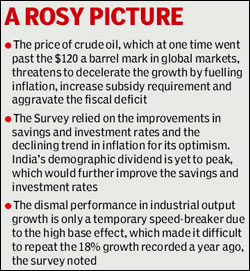India can achieve double-digit economic growth and surpass China to become the fastest-growing economy in the next four years if it improves governance, cuts down on corruption and reduces bureaucratic transaction costs, predicts the Economic Survey 2009-10.
The Survey clearly states that the economic recovery is broad-based, with 7 out of 8 sectors showing a growth of over 6.5% in the current fiscal. Additionally, pick-ups were also seen in exports growth, capital flows and industrial credit.
The economy?s report card expects the gross domestic product (GDP) growth to be close to 9% in the next fiscal and breach the 9% level in 2011-12. ?We began with a sense of uncertainty, and we are ending with a sense of confidence,? finance minister Pranab Mukherjee said on Friday.
The Survey forecast economic growth at 8.25-8.75% in 2010-11, compared with the Central Statistical Organisation?s projection of 7.2% in 2009-10. The projections are roughly in line with the forecast of the Prime Minister?s Economy Advisory Council, which pegged growth at 8.2% in 2010-11 and at 9% in 2011-12.
A robust savings and investment rate?which catapulted India into the league of the world?s fastest growing economies?is the foundation of this recovery, the Survey said. Savings, as a percentage of GDP, stood at 32.5% in 2008-09, while the investment to GDP ratio stood at 34.9% in the same year.
 ?The broad-based nature of the recovery creates scope for a gradual rollback, in due course, of some of the measures undertaken over the last 15-18 months,? the Survey stressed. Estimating the fiscal deficit at 6.5% of the GDP in 2009-10, the Survey added that the government needs to take on board the recommendations of the 13th Finance Commission for designing a calibrated exit strategy from the economic stimulus.
?The broad-based nature of the recovery creates scope for a gradual rollback, in due course, of some of the measures undertaken over the last 15-18 months,? the Survey stressed. Estimating the fiscal deficit at 6.5% of the GDP in 2009-10, the Survey added that the government needs to take on board the recommendations of the 13th Finance Commission for designing a calibrated exit strategy from the economic stimulus.
?There is a clear indication that the growth, both economic as well as industrial, is coming back on the track. As growth comes back, the case for gradual withdrawal of stimulus could become stronger and that?s a worry for the market,? said Quantum Securities director Neeraj Dewan.
The economic expansion, may result in per capita income growing at 5.3% in 2009-10, compared with 3.7% in 2008-09. However, per capita consumption growth is showing a declining trend since 2007-08, with growth estimated to fall to 2.7% in 2009-10 from 5.4% in 2008-09. The Survey recognises food inflation as a major concern. Food inflation stood at 17.58% in the week ended February 13. Strong growth and supply-side pressures are pushing up inflation, and high food prices could spill over into general inflation, the survey said. The downside risks also include a double-dip recession in developed economies which could impact India?s recovery.
